Sat 17 Dec 2011
Movie Review: TORN CURTAIN (1966).
Posted by Steve under Reviews , Suspense & espionage films[12] Comments
TORN CURTAIN. Universal, 1966. Paul Newman, Julie Andrews, Lila Kedrova, Tamara Toumanova, Wolfgang Kieling, Ludwig Donath, David Opatoshu, Gisela Fischer, Carolyn Conwell, Gloria Gorvin. Original music: John Addison. Director: Alfred Hitchcock.
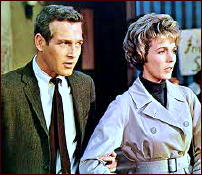
This is generally considered to be one of director Hitchcock’s lesser successes, and I think I’d go along with that, but not necessarily for the same failures that other moviegoers (and critics) have seen.
My wife and I watched this the other evening on one of the Cinemax channels for the first time since it was first released. The funny thing is she didn’t remember it at all, and the scene I remembered, I only thought I did. This is the one in which Paul Newman (as a bogus turncoat physicist) is trying to obtain a secret formula from his counterpart in East Germany (Ludwig Donath) standing together at a blackboard in a deserted classroom.
You might call this dueling with chalk and erasers. At the time I thought the scene was hilarious, being a math student at the University of Michigan myself.
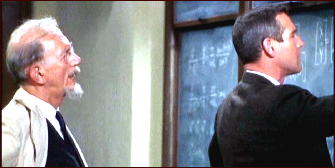
Erasing parts of equations and replacing them with bits and pieces of others: sines, cosines, vectors and tensors? It was fun to see at the time, and it was fun to see the other night.
What I didn’t remember was that this scene took place in such a small room. I remembered it happening in the large lecture room across the hall, and it’s funny what kind of tricks you mind plays on you. I have a feeling now that half the things that I remember happening to me over the years never happened the way I remember them, and it’s a eerie feeling, I can tell you.
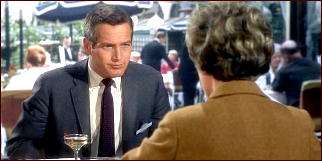
Playing opposite Newman is another huge star at the time, Julie Andrews. She’s his assistant and bewildered fiancée who with great determination — and most definitely against his wishes — follows him on this grandly noble act of undercover academic espionage.
It is obvious that chaps like Newman who find themselves in capers like this really, really ought to tell their fiancées what it is that they’re doing. All that petty deceptions do — and the petty deceptions those deceptions require — is to make only bigger messes of everything, including escapes, when the time comes.
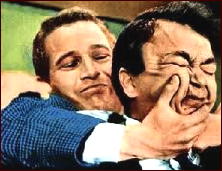
The script, then, it what I found to be the problem. Too much silly rigmarole in making contacts, et cetera, too little planning, too little communication, and I didn’t believe a word of it. Paul Newman is also too brooding – method acting? – and too self-centered.
If I were about to get married to someone who looked like Julie Andrews, I would do almost anything to make sure I didn’t mess it up. She acts like she cares for him; there’s no chemistry at all in return, no lights in his eyes the other way around.
Two big stars, then, not quite compatible, whose combined salaries left too little in the budget for a decent story, better matte shots, and less reliance on phony looking rear projection.
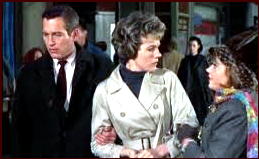
Which is not to say that Mr. Hitchcock lost his touch completely in making this film. Newman finds himself shocked at his first attempt at killing a man (Wolfgang Kieling, as the East German agent who discovers his double-dealing duplicity), a killing that is not at all easy – the scene that everyone agrees upon as being the standout, and the one most remembered, in the entire movie. It’s a dandy, all right, no doubt about it. This is the kind of scene you watch a Hitchcock movie for.

On the other hand, I liked Lila Kedrova’s performance as the expatriate Polish Countess Kuchinska even more, although a number of commenters on IMDB thought it one of the worst aspects of the film.
What dunderheads! (Figuratively speaking, of course.) Needing a sponsor to make her way out of East Germany and on to America, and having recognized Newman and Andrews as spies on the run, she is torn between coyly requesting and silently pleading for them to help — trying desperately to keep her emotions from showing on her face and not succeeding.
Newman (as is his wont throughout the movie) is stolidly not impressed by this small petty form of blackmail. It is Julie Andrews’ character who is won over. Good for her! This is the scene that I will remember now until the time I shall see the movie again.
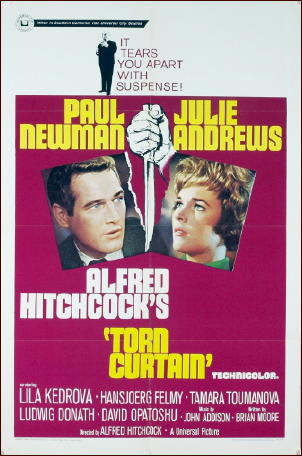
December 18th, 2011 at 7:21 am
By this stage in his career, Hitchcock was having to deal with interference from Universal executives who thought that they knew better than he did. By the time that he came to do FRENZY, he moved the whole production to London in order to escape day to day comment from the studio.
Newman was just wrong for a Hitchcock film. There’s always a good deal of artifice and stylisation in Hitch’s movies, and his favourite actors appear to have been those who understood the difference between acting and ACTING! Method actors always seem to be fundamentally at odds with his style.
Realising that memory can be treacherous is not a comfy experience. I’ve experienced it myself more than once, and was once on the receiving end from someone else. Someone I met at a film society was telling me about a film that she had seen. She could tell me the actors who starred in it, recall specific scenes, and even remembered when she had seen it. I knew that the movie didn’t exist, but suspected that she had somehow amalgamated the memory of having seen three completely different films. A few of us at the meeting tried to tell this to her, but she refused to believe us. We ended up having to get out biographies of the actors involved in order to prove that the movie didn’t exist. Even then she refused to believe that her memory was at fault, and we ended up having to agree to disagree.
December 18th, 2011 at 10:27 am
It’s been a long time since I saw this one too, but I remember it pretty much as you described it, Steve. No chemistry between Newman (who was miscast and seemed bored) & Andrews and the most memorable scene being that killing.
It’s no NORTH BY NORTHWEST, that’s for sure.
But then, few things are.
December 18th, 2011 at 11:01 am
I always had the feeling that Newman, Rod Taylor, Sean Connery, and Frederick Stafford (whatever their own merits as actors and leading men) were just fill-ins for the absent Cary Grant.
December 18th, 2011 at 11:01 am
There isn’t much to add, but all so-called method actors aren’t equal. Newman in light things, comedy, any comedy, is diastrous. Same thing could not be said for Brando, who might have been able to amuse us, and connect with Julie Andrews. She is fine.
December 18th, 2011 at 12:09 pm
One of the things that Cary Grant brought to the movies that he did was that although he was, let’s say, Roger Thornhill, he was also Cary Grant. There is a moment in NORTH BY NORTHWEST where he has to make his way through a lady’s bedroom. When she first sees him she cries out ‘Stop!’ and after realising that it is Cary Grant she repeats (wistfully) ‘Stop…’ Grant merely smiles and wags his finger. It’s not quite winking at the camera, but it’s getting there. One of the things that makes NBN so much fun is that Hitchcock makes you care about the romantic leads, whilst making it plain that he doesn’t take the Cold War plot at all seriously. Look at the scene where Leo G Carroll explains what has been going on to the sceptical Grant. They are walking through the airport, and as soon as Carroll starts to talk he is drowned out by the noise of the airplane engines!
December 18th, 2011 at 1:36 pm
In Hitchcock’s pictures sexual innuendo trumps plot everytime. Thirty-Nine Steps, Suspicion, Notorious, North By Northwest, Vertigo, To Catch A Thief. When the players don’t connect, the project thuds.
December 18th, 2011 at 2:18 pm
I did a lot of tinkering with this review before I was happy with it and posted it last night — which usually means that when I wake up the next morning, I’m no longer happy with it.
This time, though, I’m pretty much pleased with the way it reads. Thanks, everyone, for your comments so far, but please don’t stop the discussion here, if there’s more you’d like to say.
I think that a book could be written about each of Hitchcock’s movies, not just a chapter of one, and TORN CURTAIN is certainly no exception.
One thing I see that I didn’t mention is that this is the film that caused the breakup between Hitchcock and composer Bernard Herrmann. The guys with the suits at Universal may have had something to do with it, thinking that they needed something more in a “pop” vein, which maybe they got, but there’s certainly not much that’s memorable about the score provided by John Addison, Herrmann’s replacement.
I’d have to watch the movie again, but I suspect that what was “pop” in 1966 sounds awfully dated now.
For 30 second snippets of Herrmann’s unfinished score, you can listen to it on this CD, released in 1998:
http://www.amazon.com/Alfred-Hitchcocks-Torn-Curtain-Unused/dp/B000007OAH
December 18th, 2011 at 2:46 pm
When the suits interfere successfully, it usually means the big guy is done.
December 19th, 2011 at 7:24 am
Bradstreet,
I saw the movie you were talking about in your first comment, and it DOES exist!
What impresses me about TORN CURTAIN (aside from the murder scene, which recalls the one in SABOTAGE) is the fact that Hitch here was able to reduce the Macguffin to the purely theoretical. They’re always after something in a Hitchcock film (hence the “Macguffin”) but always before he had to give it some tangible manifestation: Grains of uranium in a chsmpagne bottle, an artifact with microfilm, that sort of thing…. Here, it is literally just a concept.
December 19th, 2011 at 12:41 pm
Dan
You’re mistaken and laboring under a conclusion. When you saw that movie, I’m sorry to inform you that it hadn’t even been released yet.
— Steve
December 19th, 2011 at 7:17 pm
Now, THIS is what I call coincidence- This film was aired today on the Berlin Regional TV- station rbb !
As I have already seen it, and had to go to a neighborhood punch-party, anyway, I did’nt watch it, but, upon coming home, saw in the program.
The Doc
December 20th, 2011 at 5:44 pm
Steve: It’s possible that Dan did see the movie, but those actors definitely weren’t in it. And that wasn’t the title!